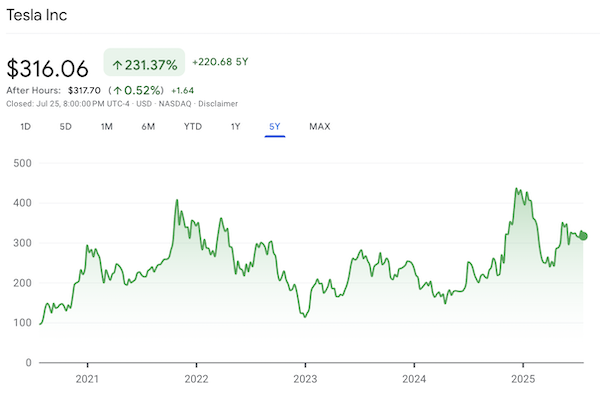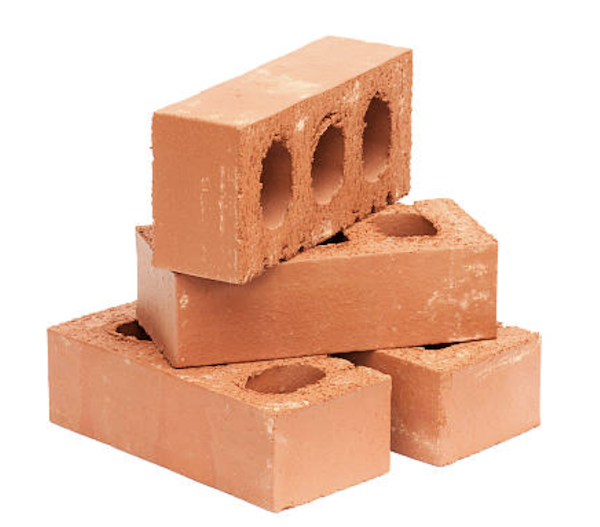Market scorecard
US markets set a new record every day last week. The words of an iconic South African TV advert come to mind, 'not too shabby hey Nige'. The big news over the weekend was that the US and EU have agreed to a one-sided trade deal, setting export tariffs at 15%, which one commentator called "less worse than expected", so markets look set to rise further today.
In company news, Deckers Outdoor (Uggs and Hoka shoes) soared 11% on better-than-expected numbers. In the same industry, Puma plummeted 15.7% after warning of weak demand and the threat of tariffs. Finally, Intel fell 8.5% because they are laying off 15% of their workforce and scaling back chip foundry plans.
In summary, the JSE All-share closed down 1.05%, but the S&P 500 rose by 0.40%, and the Nasdaq ended 0.24% higher. That was a great week.
Our 10c worth
One thing, from Paul

Houston, we have a problem. One of our recommended portfolio stocks is in trouble.
We own Tesla because it's an iconic company that pioneered modern electric vehicles and is run by one of the most innovative people alive, Elon Musk. Unfortunately, it's down over 30% from its December 2024 peak, while the broader market is smashing through all-time highs.
It's revenue is declining, margins are compressing, and cash flow has dried up. There have been a number of senior staff departures.
Tesla categorises its business into three divisions. Automotive is the biggest, contributing 74% of revenue, and includes sales of electric vehicles (models S, 3, X, Y, and the Cybertruck).
That's the part of the business that is crashing. Global deliveries fell 13%, the steepest quarterly drop ever. The lack of new models is starting to show, and the brand has suffered because of Musk's political antics. To make matters worse, the Federal government will soon retire the $7 500 consumer tax credit for US-based EV buyers.
Sales in Tesla's second biggest market, China, have also been sliding, despite price cuts. Tariffs and escalating competition from BYD and Xiaomi are deeply concerning.
Services revenue is next at 14%, and includes sales from software, vehicle servicing, and the Supercharger network. This is the division that is supposed to be the future of the company. More on that below.
Energy generation and storage is the last division at 12% of revenue and includes utility-scale battery projects, the Solar Roof and Powerwall. That unit is actually doing well.
Tesla had a significant profit booster in the past from selling regulatory credits to other automakers that needed to offset emission penalties, but those are being eliminated. Tesla's revenue from third-party credits dropped by 51% year-on-year in the second quarter. Analysts now expect credit revenue to fall 40% next year and vanish by 2027.
387 Vestact clients own Tesla shares, which is about 36% of our entire customer base. It's been a frustrating share for the last few years. When it's going up, you are annoyed you don't own more, when its going down you wonder why you still own so many.
Elon Musk is a genius, but also a deeply divisive character. He just takes on everything, without a second thought. Sending rockets to Mars is great, but why does he need to own Twitter? Weeks after promising to focus more on Tesla after dropping out of DOGE (Department of Government Efficiency), he announced a new political movement: the America Party. Another silly distraction.
Tesla's "bull case" is premised on autonomous driving solutions (including robotaxis), the robotics division that makes Optimus machines, and various AI projects.
Despite a slow start in Austin, Musk claims the Tesla robotaxi network could eventually add $5 to $10 trillion to their market cap. That seems a bit far-fetched, since Uber, by comparison, has 170 million monthly active users and nearly half of the global ride-hailing market share, but is worth under $200 billion.
The problem with Musk's projections for driverless cars is that he's not the only one eyeing that market. For now, Google-owned Waymo remains far ahead, having completed more than 250 000 paid, fully driverless rides per week across four US cities. Amazon's Zoox and an Uber/Lucid partnership will be running by 2026.
Tesla's 5-year share chart (see below) does not look too bad. It's market cap is still around $1 trillion. However, it trades on a price to earnings ratio of 188. Investors are being asked to pay a sky-high multiple for financial performance that has stunk for the last two years. They're buying hope.
Should we just kick Tesla out of our portfolios by selling them outright? Let's not be too rash. But for now, we are reluctant to buy Tesla shares for new clients, or to add to the position of those who own it already.
If Tesla is more than 10% of your portfolio, you might want to consider reducing that to a more sensible level, given the risks described above. If you own them and you are concerned, send us an email and we'll give you some direct advice.
Byron's beats

We get asked quite often why we don't offer clients access to other markets like India, China or Europe. On Friday, a client asked what our plan was for a post-USA-dominated world and wanted to explore more BRICS exposure. Here was my response.
Firstly, we still think the US will dominate global economic growth. The vast majority of technology innovation is coming from America and we are still in the early stages of the AI boom.
Secondly, we like to be in a mature market that has mostly been through their own Enrons/housing bubbles/banking crises. There are still a lot of landmines in the BRICS countries, like the recent Adani group saga in India.
Thirdly, the US stocks we invest in all have large international operations. These companies have no borders and have big exposure (and expanding) to many BRICS nations.
Lastly, the behaviour of a few BRICS members has been terrible. Russia is a global pariah, China keeps shooting itself in the foot with regulations, and the same with Brazil. Let's not even mention Iran. South Africa, need I say more. Our clients have more than enough emerging market exposure through their SA assets (homes, businesses etc).
Michael's musings

Wise Move, a company that helps people move homes released a report analysing 15 000 relocations inside of South Africa from 2024. Around 70% of all moves happen within the same province, which makes sense, as most people changing houses would be to something down the road from their current location.
That means 30% of the moves were between provinces, which on first reading, I found surprisingly high. On reflection it seems correct though, as I probably know as many people who moved to Cape Town recently as those who moved within Joburg.
Unsurprisingly, 48% of all inter-provincial relocations were from Joburg or Pretoria to Cape Town. People are moving from areas with failing municipalities to ones that work. Make sure to keep this in mind when you vote at the municipal elections next year.
The third most popular route is Cape Town to Joburg, so some people are heading back, which would correspond with what I've heard from estate agents. The reason for coming back to Joburg is often career based, as many head offices are still in the city of gold. Of course, Joburg property prices are amazing in comparison, where you can get a well-located, large house for a fraction of any Cape-based property.
I'll be interested to see the 2025 numbers. At some point, the Cape will run out of space for new 'Vaalies', but going days without water is a very effective motivator to move to a working province.
Linkfest, lap it up
Travel is wonderful, but pricey. Enlightenment and new experiences are within reach - Tips to save money on your trips.
AI is becoming more useful by the day. Now we can do more with less time - More UK employers are embracing 4-day work weeks.
Signing off
Asian stocks with large European operations are mostly higher thanks to yesterday's trade deal between the US and EU.
In local company news, Cashbuild announced a 4% revenue increase for the quarter, compared to last year. Impressively, their internal inflation was only 1.7%. The market was hoping for more sales growth though and the share price dropped 2.25%.
This is a big data week for the US. There are GDP and jobs numbers out, an inflation update, and the Fed's latest interest rate decision. On top of that, it is a monster week for second quarter results - Amazon, Apple, Meta, Visa and Microsoft will all be reporting. US futures are higher this morning and the Rand is at $/R17.73.
Have a good week. Good luck surviving the cold snap that has gripped the whole country.